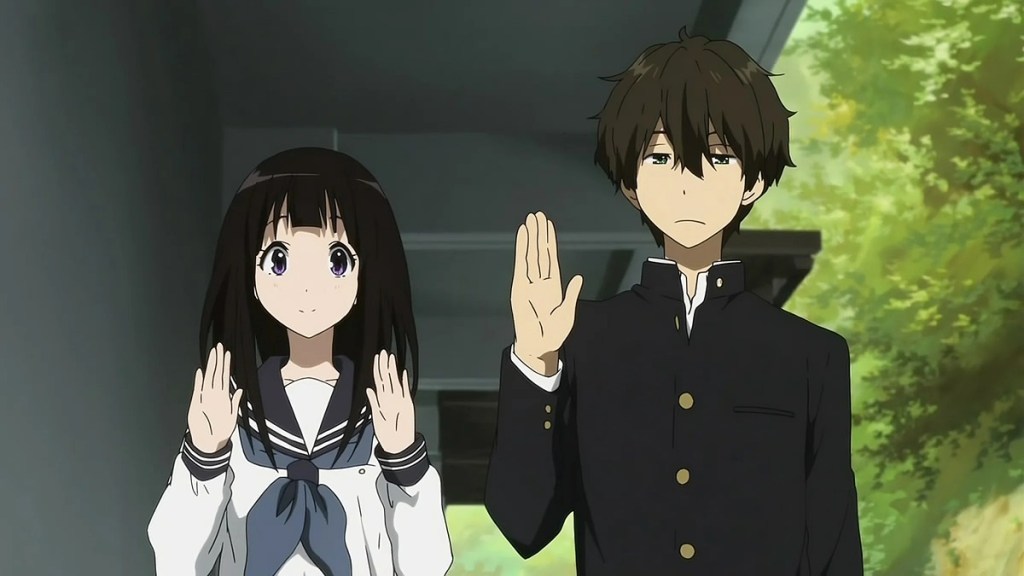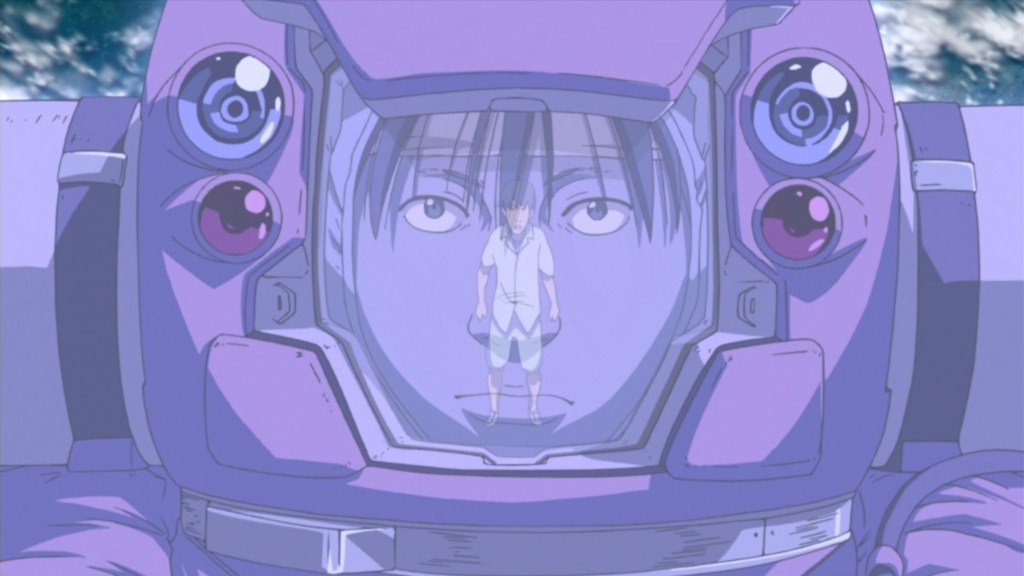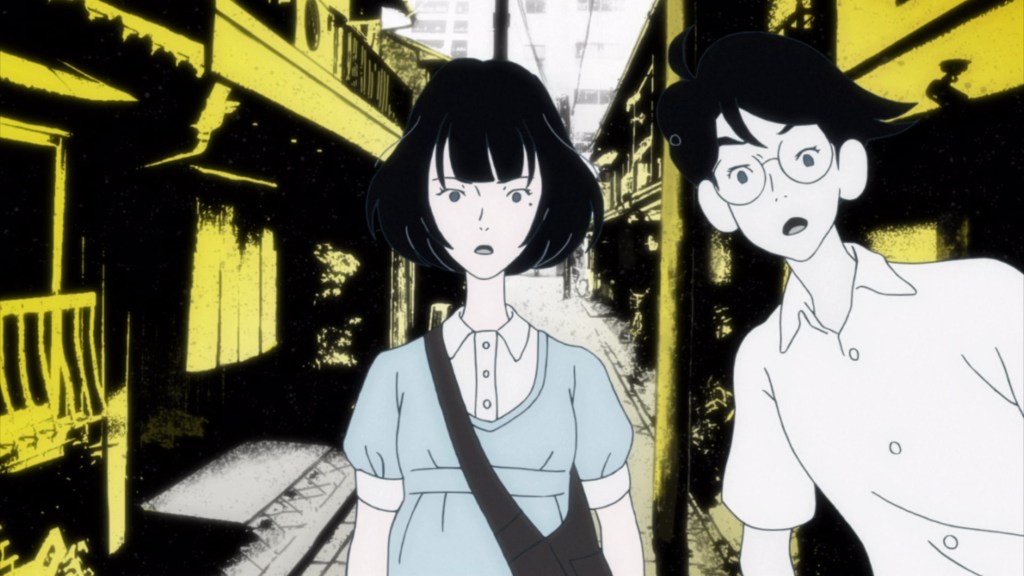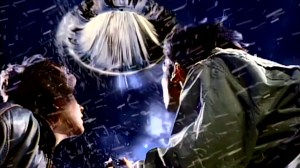There are anime that don’t sell action figures or trend on streaming charts but linger in memory precisely because they don’t play by the rules. The truth is, anime’s greatest strengths — its freedom of form, its willingness to blend the absurd with the profound — are also what condemn its most daring works to obscurity. Shows that take creative risks, whether through unconventional pacing, abstract visuals, or moral introspection, often get dismissed as “too slow” or “too weird.”
Videos by ComicBook.com
But these outliers are what keep the medium honest — reminders that art isn’t just about escapism or adrenaline but reflection and craft. We don’t lack masterpieces in anime. We just fail to look long enough to see them.
5. Hyouka

Hyouka is a mystery anime, but not in the traditional sense of crime-solving or supernatural intrigue. Instead, it follows Oreki Houtarou, an energy-conserving high school student who is reluctantly drawn into solving small, everyday mysteries by his endlessly curious classmate, Chitanda Eru. Together with their Classic Literature Club friends, they unravel puzzles ranging from missing items to forgotten school events. The mysteries themselves aren’t about murder or magic; they’re about human behavior, emotion, and memory. When it aired in 2012, many viewers were riding the wave of big, explosive series (Attack on Titan, Sword Art Online, etc.). Hyouka, with its quiet pacing and introspective tone, didn’t fit the mold. To younger viewers or action-focused fans, Hyouka could seem slow or uneventful. But for those who’ve come back to it later, it reveals itself as one of Kyoto Animation’s most thoughtful and restrained works.
4. Planetes

Planetes is a story about the unsung heroes of space exploration—debris collectors. Set in the year 2075, the anime follows the crew of the “Debris Section,” a ragtag team tasked with removing hazardous space junk orbiting Earth. While the premise might sound mundane, the series uses this backdrop to explore profound themes. Its questions about corporate control, colonization, and environmental destruction ring louder than ever. It dared to strip away sci-fi’s fantasy and show what space capitalism might actually feel like for the people doing the grunt work. It wasn’t appreciated enough back then because it refused escapism — but that’s exactly what makes it timeless now.
3. Mushishi

Mushishi follows Ginko, a wandering “Mushi Master” who travels through a timeless, pastoral Japan studying mushi — otherworldly life forms that exist somewhere between spirit and organism. Each episode is a self-contained tale exploring how these beings disrupt or intertwine with human lives. There’s something almost sacred about silence in storytelling — that rare stillness where meaning lingers between moments rather than exploding from them. Mushishi lives entirely in that space. It isn’t flashy, it isn’t fast, and it doesn’t beg for your attention — it earns it, gently, episode by episode. And perhaps that quiet grace is exactly why it slipped under the radar for so many viewers.
2. Tatami Galaxy

Tatami Galaxy follows an unnamed protagonist who, dissatisfied with his life, wishes he had made different choices. Each episode reboots his story, showing how his life would have unfolded if he had joined a different campus club or followed a different path. However, no matter what he does, he ends up in a mess of his own making, perpetually chasing the elusive “rose-colored campus life” he dreams of. Its surreal and experimental style also likely alienated some viewers.
Directed by Masaaki Yuasa, known for his bold approach to animation (Devilman Crybaby, Kaiba), the show’s art style is deliberately abstract, with distorted perspectives and an almost dreamlike quality. While this makes Tatami Galaxy visually thematically rich, it’s far from the conventional aesthetics that mainstream anime fans often gravitate toward. Perhaps the most significant reason for its underappreciation, though, is that Tatami Galaxy demands active engagement. It’s not a show you can half-watch or binge mindlessly. When it aired in 2010, it was simply too weird, too talky, and too smart for its time.
1. Kaiba

Directed by Masaaki Yuasa, Kaiba is a sci-fi odyssey set in a distant future where memories can be stored, transferred, and transplanted into new bodies. The story follows a young amnesiac named Kaiba, who wakes up with a hole in his chest and a pendant containing a mysterious woman’s photograph. As he drifts across bizarre worlds and borrowed bodies, he pieces together who he is, what he’s lost, and what it means to be anyone at all. Kaiba starts as an episodic series, with each episode exploring a standalone story about different characters. It’s only in the latter half of the series that the overarching narrative kicks into high gear, tying everything together.
But by that point, many viewers may have already tuned out, mistaking its slow start for aimlessness. The show’s heavy themes also play a role in its underappreciation. Kaiba doesn’t shy away from exploring deeply unsettling ideas: the exploitation of the poor, the commodification of identity, and the fragility of human connections in a world where memories can be erased or altered. While it may never achieve mainstream fame, its boldness and heart ensure it will always be treasured by those who dare to delve into its strange and wonderful world.
What do you think? Leave a comment below and join the conversation now in the ComicBook Forum!









